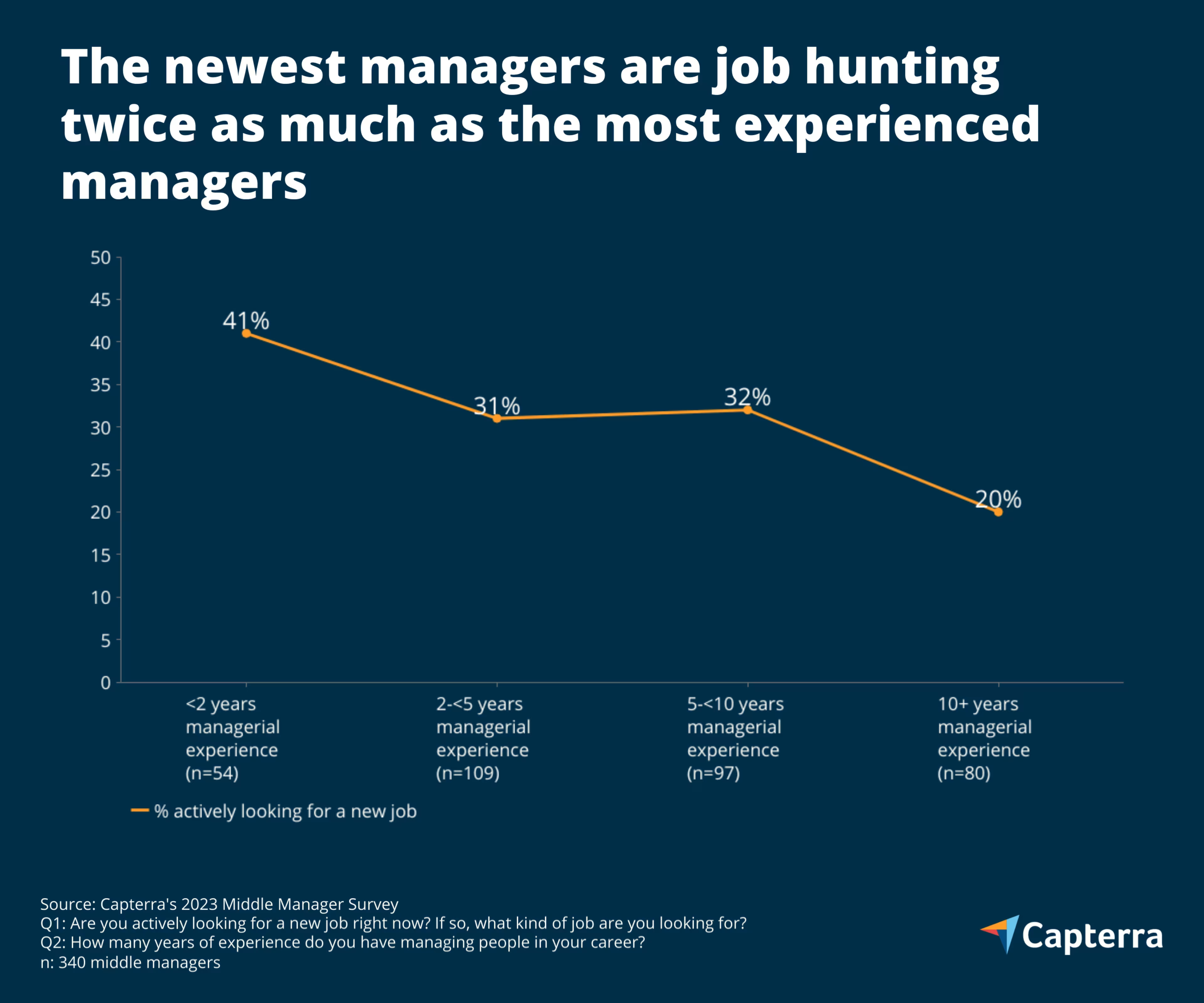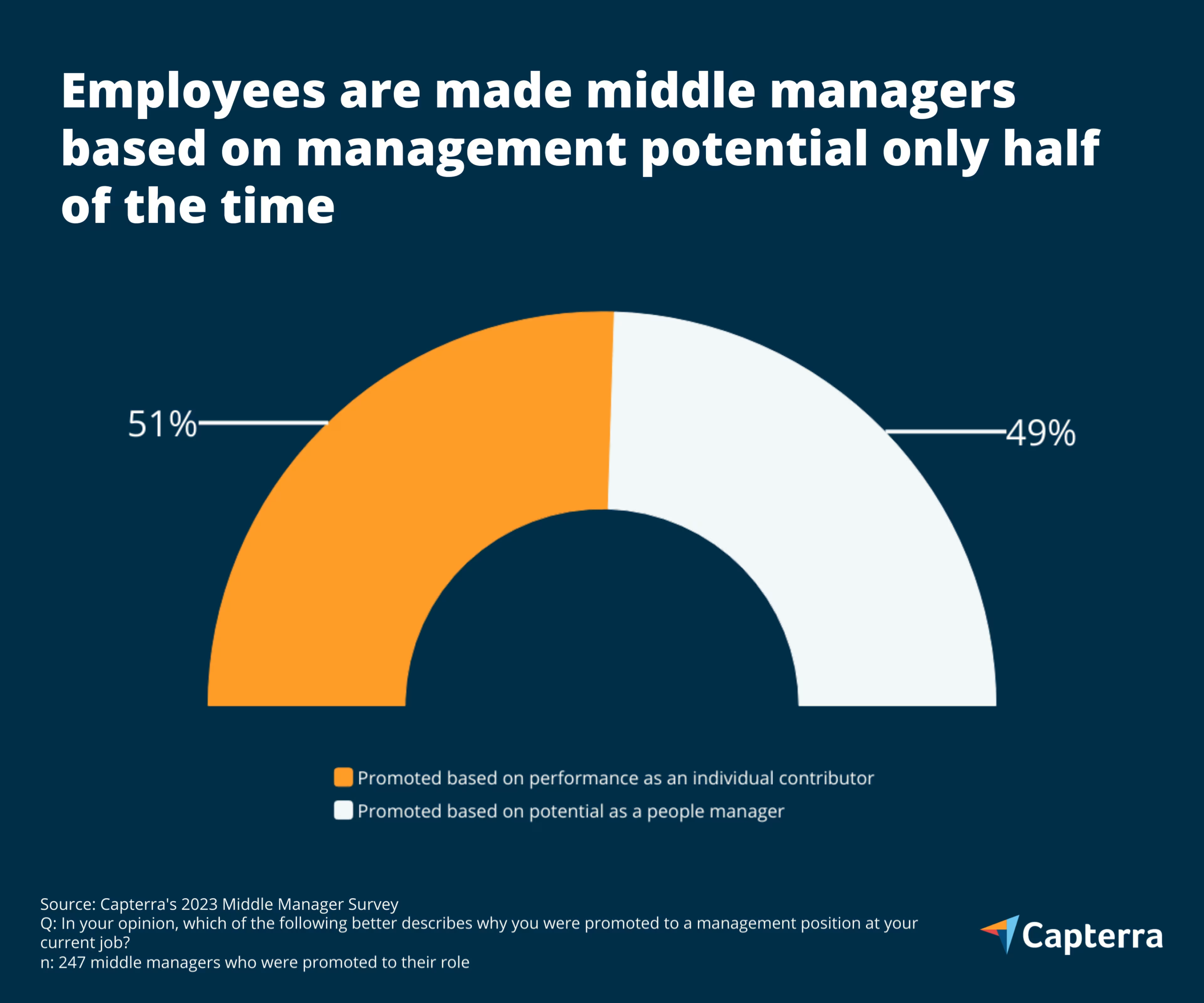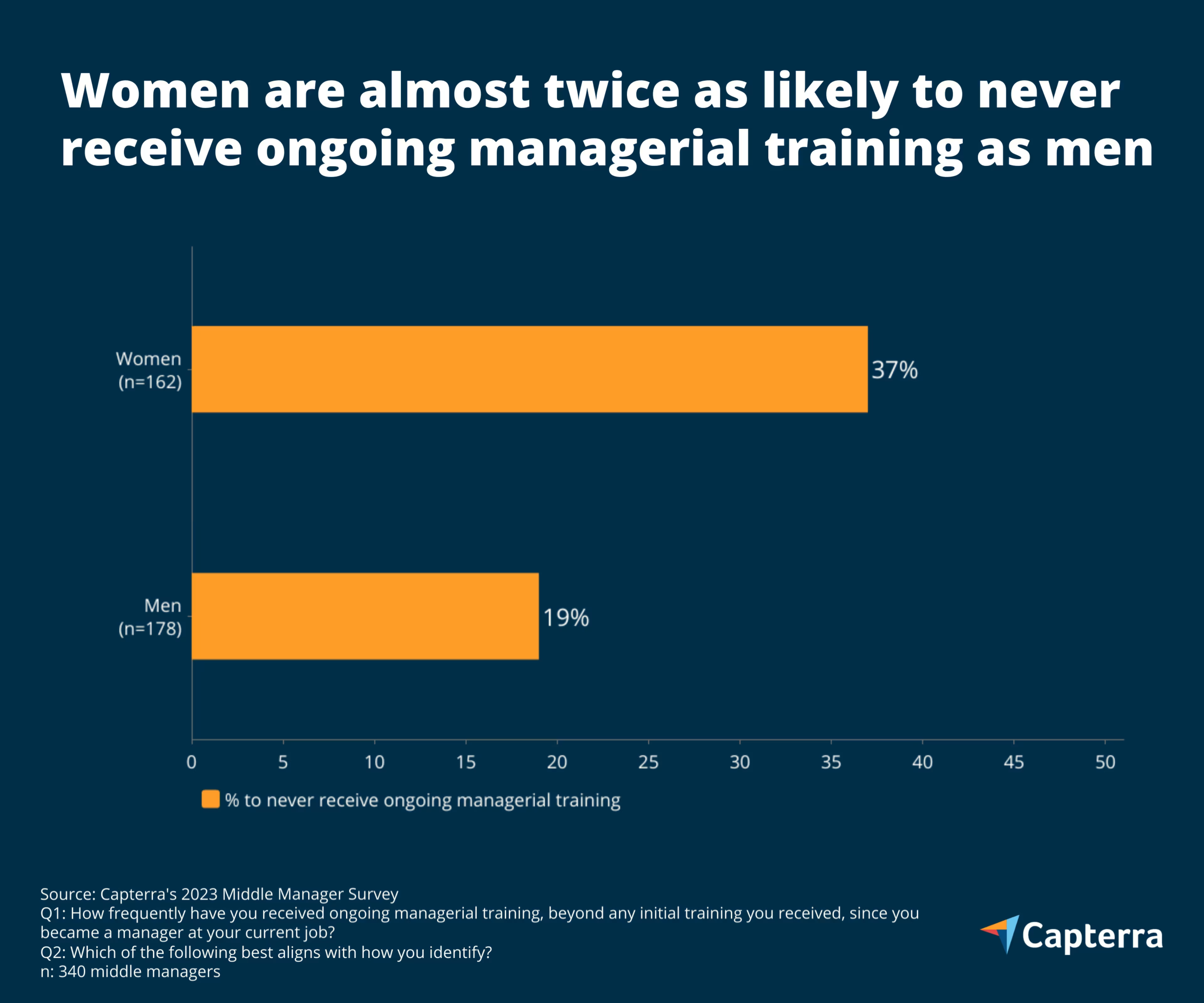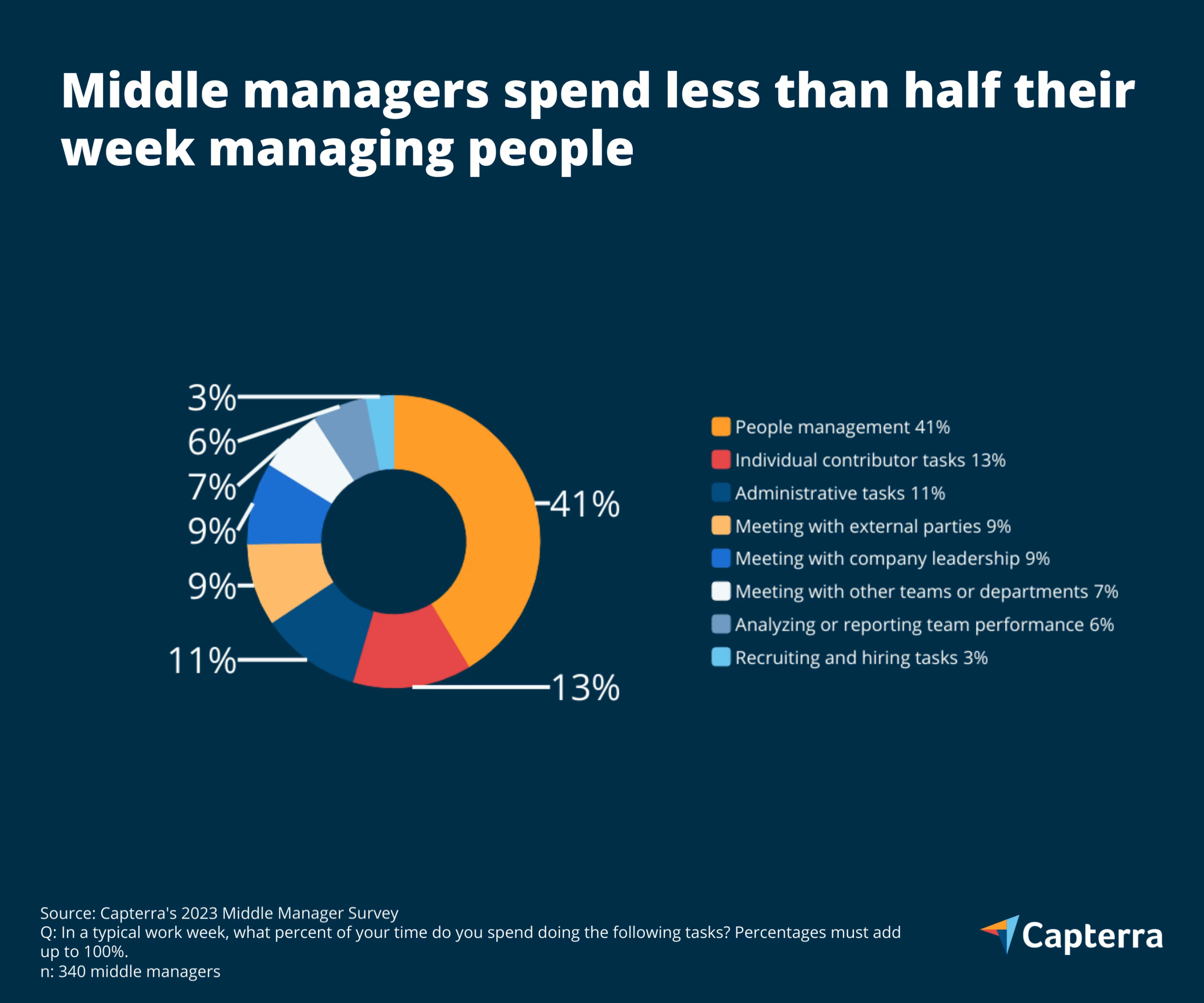Nearly 3 in 4 middle managers globally say they "sometimes" or "always" feel burned out at work.
Meta and X (formerly Twitter) made headlines in 2023 by eliminating or demoting entire levels of middle management in a move that Meta CEO Mark Zuckerberg called “good for the industry.”[1] As companies look for ways to remove inefficiencies and cut costs in 2024, should they follow in Big Tech’s footsteps and say goodbye to their middle managers?
We don’t think so. Middle managers remain as vital to business success as ever, acting as critical conduits to turning strategy at the top level into action at the bottom level, and having more impact on a worker's day-to-day morale and engagement than anyone else.
To better understand how HR can support this much-maligned level of the organization, Capterra’s 2023 Middle Manager Survey collected hundreds of responses from middle managers around the world.* Here’s what we learned: Middle managers are struggling mightily right now, but HR leaders can set these employees up for success by reevaluating as a company who they promote to middle management, how they develop them, and what tools they implement to automate some of their workload.
/ Key findings
Most middle managers say they’re spread too thin: 53% say they don’t have enough time in a typical week to do everything they need to do, and 51% say it’s impossible to give all of their direct reports the one-on-one time they need.
Employers promote people based on management potential only about half of the time: Middle managers are just as likely to be promoted to their role based on their performance as an individual contributor (51%) than their potential as a people manager (49%).
Managerial training is a rarity: Only 37% of middle managers received managerial training when they were hired or promoted to their role, and 74% say they “rarely” or “never” received ongoing managerial training afterwards.
Middle managers spend less than half their time actually managing people: On average, middle managers only spend 41% of their work week doing direct people management.
Middle manager burnout is high—especially among younger, newer managers
According to Gartner, manager development should be the top priority for HR leaders this year, and our survey data underscores why.[2]
In our survey, 71% of middle managers say they "sometimes" or "always" feel overwhelmed, stressed, or burned out at work. This number is even higher among those aged 35 or younger (75%), those who work at large enterprises (1,001+ employees, 76%), and those who work at hybrid businesses (76%).
Combating employee burnout is nothing new if you work in HR. But we find that nearly one-third of middle managers (30%) are so fed up in their current role that they are actively looking for a new job right now.
Most alarmingly, we find that the younger a person is, and the newer they are to middle management, the more likely they are to be job hunting. Over 40% of managers with less than two years of managerial experience are looking for a new job right now, for both management and non-management positions, compared to just 20% of managers with 10 or more years of experience.

Unless employers are able to curb this trend soon, companies won’t have enough younger managers to replace older managers as they retire. Subsequently, the number of direct reports per manager will have to go up—adding more stress for managers and diminishing the work experience for rank-and-file employees.
As the department responsible for developing leaders to future-proof the business, HR plays an important role in stemming the tide of middle manager burnout. But throwing resources at traditional manager development programs alone is not enough. As Gartner puts it, “the manager job is no longer manageable.”[2]
Instead, HR needs to work with executive leadership to rebuild the middle manager role entirely. Here are three recommendations for how employers should overhaul the middle manager level to reduce burnout and increase role effectiveness.
Recommendation #1: Promote managers based on potential, not performance
The problems with middle management start with who is made middle manager in the first place.
Decades of research have lent evidence that the best worker is not always the best candidate for manager.[3] Despite this, we find that the middle managers in our survey who were promoted to their role were just as likely to be promoted because of their performance as individual contributors as they were for their potential as people managers.

HR can help break this archaic cycle and ensure those with the highest management potential get promoted in two ways.
The first is by working with executive leadership to identify the top skills they believe translate to being a good manager. After these skills are identified, department heads should be tasked with looking at their current teams and assessing each employee’s proficiency in these various skills. Succession planning software is great for this, as it automates the entire process while giving users data breakdowns and visualizations to help them make key promotion decisions across the organization.
The second way HR can help is by altering the career paths in the organization so that the only route for upward mobility isn’t through management. Not only does this give high-performing individual contributors a path to stay and thrive at the company to the best of their abilities, but it also gives new middle managers an exit that isn’t a demotion if management turns out to not be their forte.
Gartner finds that organizations who normalize this “opting out” of management more than double their likelihood that the managers who remain find their jobs manageable.[2]
Recommendation #2: Offer more training, both formally and informally
Even if companies are promoting the right people with the highest management potential, we find that many middle managers are being set up to fail almost immediately due to a lack of training. In our survey, only 37% received managerial training when they were hired or promoted to their role, and 74% say they “rarely” or “never” received ongoing managerial training afterward.
With middle managers who work remotely and those at small businesses (one to 100 employees) being most likely to say they have never received ongoing managerial training, a lack of early investment in digital training resources is likely to blame. If your company hasn’t already implemented a learning management system (LMS), these tools can help you quickly scale your digital training program. Middle managers in our survey say they would most like to receive more training in conflict resolution (41%) and project management (35%)—topics on which there are hundreds of pre-made courses available that you can customize and reuse as needed.
A lack of formal resources doesn’t explain the gender divide in our data, however. Alarmingly, we find that female middle managers are almost twice as likely to say they’ve never received ongoing managerial training compared to male middle managers.

This is where more informal sources of training, such as mentorships, can make a difference and fill inequitable gaps in managerial development. Mentorship programs, set up officially by HR and encouraged by executive leaders, pair new managers with existing leaders to help them learn important intangibles and get feedback on their performance.
Fifty-nine percent of middle managers in our survey were not paired with a mentor when they became manager, nor did they seek a mentor out on their own. The more this kind of informal training can be encouraged, the more likely that managers will be prepared for the job ahead.
Recommendation #3: Remove hurdles to actual people management through automation
You’ve promoted the right people and given them the resources they need to develop. This is progress, but it still doesn’t fix the problems with the actual job of being a middle manager.
In short, middle managers are expected to do too much. In our survey, 53% of middle managers say they don’t have enough time to accomplish everything they need to do, and 41% say they have more responsibilities than they can reasonably handle.
When asked how they split up a typical work week between various tasks, we find that less than half of their time (41%) is spent on actual people management. The rest of the time, middle managers are most often stuck doing individual contributor tasks that their direct reports should be doing (13%) or administrative tasks (11%).

The amount of time middle managers spend on individual contributor tasks points to a lack of delegation (or a lack of staff), but the bigger issue from an HR standpoint is how much time middle managers are spending on tasks that can be easily automated.
Business intelligence tools, for example, can generate real-time performance dashboards that can be shared with executive leadership and produce helpful visualizations and insights to cut down on the time needed to analyze and report performance. Applicant tracking software has templates for interviews and applicant grading so middle managers can assess job candidates quicker.
But middle managers say the biggest area where automation, and artificial intelligence (AI) specifically, can help them is with administrative tasks. In fact, contrary to the fear that AI will replace managers entirely, 76% of the middle managers in our survey actually have a positive attitude toward AI, believing it can help them be a better manager. And they think AI has the highest potential in how it can automate administrative tasks such as managing budgets, tracking expenses, and creating employee schedules.
Automation won’t fully absolve middle managers of their non-people management responsibilities, but it should allow them to devote a lot more time to their teams than they do now.
Middle managers need your help
One middle manager can be the difference between a critical employee staying at a company for decades or walking out the door within six months. That’s why, despite trends toward flattening the org chart and eliminating the level entirely, companies need to put more resources behind their middle managers in 2024 to help them succeed. Rethinking the middle manager role using the recommendations in this report can help right the ship on middle manager burnout and set your organization up for success this year.
If you’re interested in learning more about the latest HR trends and best practices, check out these other resources:
